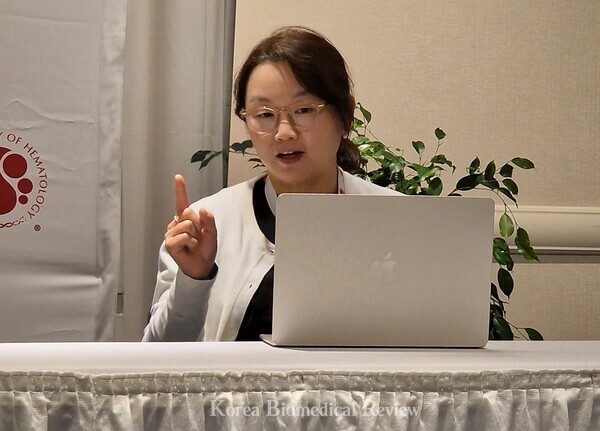**SAN DIEGO, Calif. – By Lee Han-soo/Korea Biomedical Review correspondent --** A landmark study, presented during the plenary session of the 2024 American Society of Hematology (ASH) Annual Meeting, could revolutionize the treatment landscape for pediatric B-cell acute lymphoblastic leukemia (B-ALL) in Korea, according to a leading Korean hematologist Professor Kim Hye-ri of Asan Medical Center.
The phase 3 Children's Oncology Group Study AALL1731 demonstrated that adding Blincyto (ingredient: blinatumomab) to standard chemotherapy significantly improved three-year disease-free survival rates in pediatric patients with newly diagnosed, standard-risk B-ALL.
The study showed particularly impressive results, with disease-free survival rates of 97.5 percent versus 90.2 percent in standard risk-average patients and 94.1 percent versus 84.8 percent in standard risk-high patients when comparing blinatumomab plus chemotherapy to chemotherapy alone.

Professor Kim Hye-ri at Asan Medical Center explains the significance of the plenary study presented at ASH 2024 during an interview with Korea Biomedical Review on the sidelines of the ASH 2024 conference, currently ongoing from Saturday to Tuesday in San Diego, Calif.
"This study marks a historic moment in pediatric ALL treatment," Kim said. "For the first time in approximately 20 years, we're seeing significant survival improvements in standard-risk ALL through the introduction of immunotherapy.”
The fact that blinatumomab prevented relapse in 7 percent of standard risk-average and 10 percent of standard risk-high patients is remarkably significant, Kim added.
The findings hold particular relevance for Korea, where current insurance coverage for blinatumomab is limited to adult patients aged 18 and older, and only for minimal residual disease (MRD) treatment with a single cycle.
Professor Kim emphasized that the study's results demand urgent reconsideration of these restrictions.
"This randomized clinical trial provides the highest level of scientific evidence, effectively establishing a new standard of care," she said. "The evidence was so compelling that the study's Data Safety Monitoring Board halted randomization, deeming it unethical to continue assigning patients to treatment without blinatumomab."
Korea is well-positioned to implement these findings, thanks to a nationwide ALL clinical research and NGS-MRD study funded by the late Samsung Chairman Lee Kun-hee's donation.
"Our current laboratory protocols and testing capabilities already meet the risk stratification requirements of AALL1731," Kim said. "We could rapidly integrate this treatment approach if insurance coverage is expanded."
Kim recommends specific changes to Korea's insurance coverage criteria, suggesting that blinatumomab combination therapy should be covered for up to two cycles in first-line treatment for patients with post-induction MRD levels of 0.01 percent or higher, as measured by high-throughput sequencing.
The study's implications are particularly relevant given the current distribution of ALL cases in Korea, where standard-risk patients comprise approximately 50 percent of cases, with high-risk and very high-risk cases each accounting for about 25 percent.
Within the standard-risk group, the favorable-risk subgroup represents 51 percent, while average-risk and high-risk subgroups make up 34 percent and 15 percent, respectively.
"Moving forward, any treatment protocol for standard-risk ALL that excludes blinatumomab would be considered outside global standards," Professor Kim concludes. "The presentation of these results in ASH's plenary session underscores their transformative importance, reflecting unanimous recognition from the international ALL treatment community."